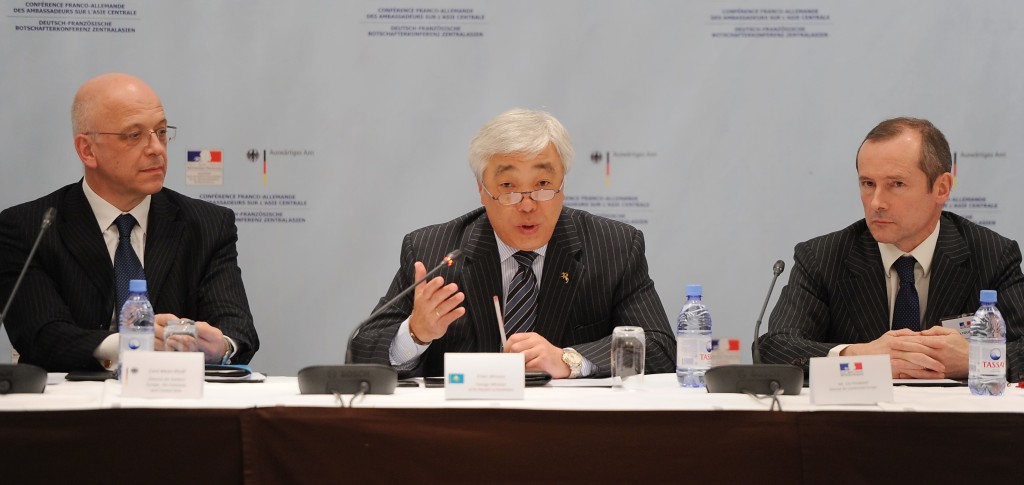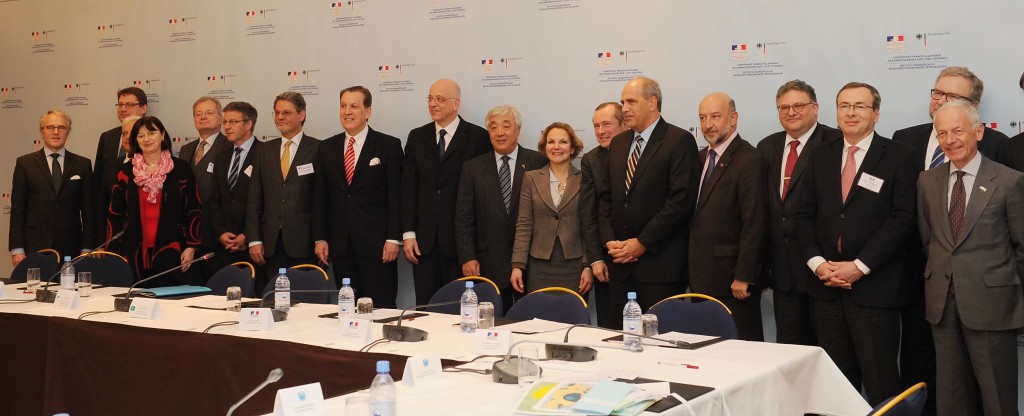ASTANA – Kazakh Foreign Minister Erlan Idrissov addressed the March 30 French-German regional meeting of ambassadors, thanking them for their work on revising the EU Strategy for Central Asia and stressing the need for increased effort – and funding – for economic growth and integration and even calling for a “Central Asian Marshall Plan” to support regional development.
Fostering growth and integration, “is a very challenging task; I’ll be very frank with you,” Idrissov told the French and German ambassadors and other diplomats from Central Asia, Afghanistan, China and Russia which gathered in the Kazakh capital for a meeting which was rather unusual in the choice of venue. “We have to be strategically patient with regard to this reality and find practical ways of bringing a new future for Central Asia,” he said. He went on to detail Kazakhstan’s steps toward development and its advice on the new EU strategy for the region.
Idrissov noted that the meeting’s main thread of discussion had been the growth and development of Central Asia. He also thanked participants for the ongoing work within the EU on elaborating a new EU strategy for Central Asia for 2015 and beyond. Kazakhstan had identified three priority areas: security issues, connectivity and economic diversification, he said. He also identified environmental and water management issues as well as institution building as key sectors.
Economic diversification would be crucial, Idrissov said. “The economies of this part of the world are very weak,” he said. Major effort and resources – human, financial and other – would be needed to ensure sustainable growth, particularly in countries that lack clear economic strategies. Kazakhstan would be happy to join hands with the EU to support the development in the region, Idrissov said. “A lot of effort should be given to make sure that they find their way to economic growth and development,” he added.
Kazakhstan has a bigger, stronger economy than some of its neighbours, the foreign minister noted. “We are not rejoicing about that. We believe that our strength lies in the strength of our neighbours, therefore we are trying to develop policies to support them,” he said.
Among environmental issues, water remains the bone of contention, Idrissov noted, and a new water culture is needed in the region to curb water waste he called “shocking.”
“I think the water initiative of the European Union is a useful tool,” but thoughts and policies must be translated into practical steps, he said. A new culture of treating water would be no less important than finding the right ways to distribute water and power throughout the region, and it must be developed along with policy solutions on water management, Idrissov counselled. Wasted water is a problem in every country in the region, he said.
Institution building would also be a key aspect of development, Idrissov said. Institutions are weak across the region, he added. “Therefore, institution building presents a very crucial aspect of policy with regard to this part of the world.”
What this comes back to is local capacity building, Idrissov said. “In fact, when we talk about all these aspects – security, economic development, diversification, connectivity – we have to talk about enabling these countries and enabling the actors within these countries to achieve those goals.” Without stakeholders and actors within target countries, nothing will happen, he said. “Building this capacity particularly on the grassroots level, building capacity through institutions, nurturing the middle class – this is the most important task.”
Economic development will fail without the development of viable private sectors, he noted, saying every country in Central Asia could have a stronger private sector, including Kazakhstan.
“We understand that capacity building is a huge exercise and we are trying to allocate resources and focus our attention on these aspects in Kazakhstan,” Idrissov said. He highlighted President Nursultan Nazarbayev’s recent articulation of five key reform areas to develop, and brought three to the forefront: the development of human capital, the rule of law, and gradual political growth and liberalisation.
Idrissov connected the rule of law with supporting the middle class. “The middle class are the ones who will be the stakeholders in successful development – economic, political – in today’s Kazakhstan and they will be the most motivated parts of society to make sure that these institutions and development is sustained. … This fully applies to other Central Asian countries.”
Finally, Idrissov said, Kazakhstan does not shy away from conversations about democratic growth and liberalisation. “Our message is very simple. We are not going to be Jeffersonian democracies tomorrow or even the day after tomorrow.”
“The most important task is developing a new political culture in our society. … We should not forget that we came out of a completely different political culture of the former Soviet Union,” Idrissov explained.
Expecting a quick change is “naive,” he said, when policy is important, but the change will be mostly generational. “All Central Asian countries are living through an important period of generation change, which creates lots of speculation in the West about succession and succession issues. Our answer to succession is very simple: reliance on better educated, more sophisticated and forward looking young generation.”
Kazakhstan is doing this through, among other efforts, Nazarbayev University and the Bolashak Presidential Scholarship Programme, which sends students to study overseas. Kazakhstan pins its hopes on the young generation, he said, and in the meantime, continues to focus first on economic development, second on political development, as its society continues to evolve.
He also called upon Europe to invest in Kazakhstan and Central Asia. “I will tell you very openly that the expectation of Central Asian countries is that the strategy will bring resources,” Idrissov said. “All countries lack resources. A sort of Marshall Plan for Central Asia could be contemplated,” he said, referring to the American initiative, worth about $160 billion in today’s dollars, to help Europe recover after World War II. “I dream of this type of approach, and of enhancing the policy document with serious resources – well structured, well articulated and well delivered,” the Kazakh foreign minister said explaining that these are largely “pragmatic” expectations from other countries in the region.
The new strategy should take into account country-specific needs of Central Asian nations and consider offering “something practical” to make their participation in regional integration processes seem worthwhile.
The 2007 strategy viewed Central Asia too much as one whole. “Country-specific knowledge and education will help produce better regional projects and better regional approaches – this is how we see it and we hope this message will be heard,” Idrissov said.
Idrissov also called for projects on a grander scale. “The second strategy should be a new step in terms of target-orientedness. It is better to focus on bigger projects rather than scatter resources and efforts through many small projects,” he said.
Concluding, the foreign minister noted that Kazakhstan was in the midst of a shift from one group of countries to another, from an aid recipient to a donor nation, with its new KazAID official development assistance programme. “We hope we can find synergy between our own programme with external supporters like the EU and with bilateral donors like your countries. … We see the merits of this type of combined approach.”



